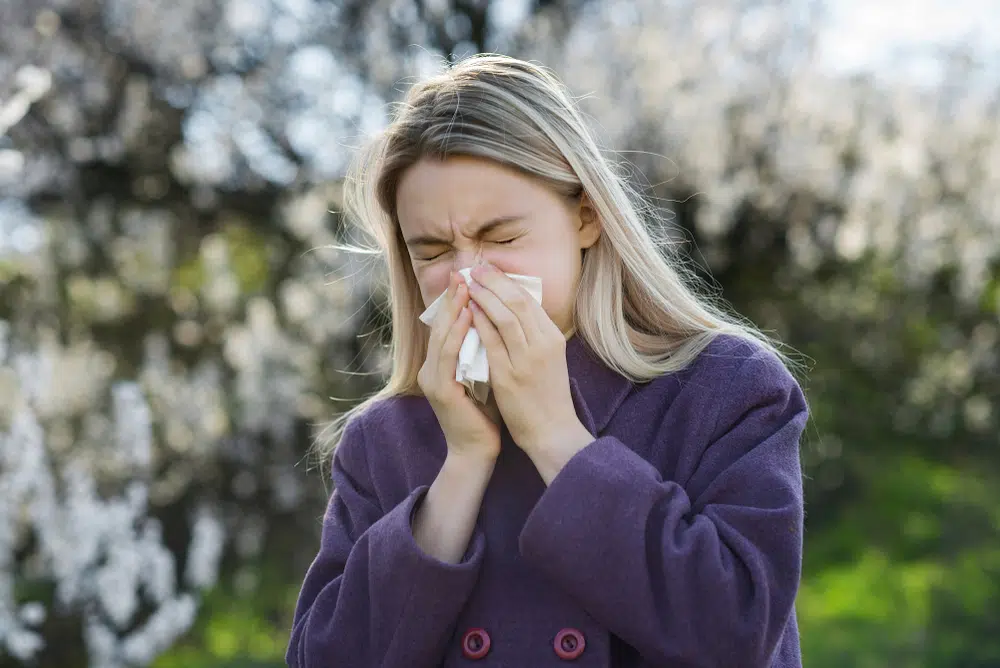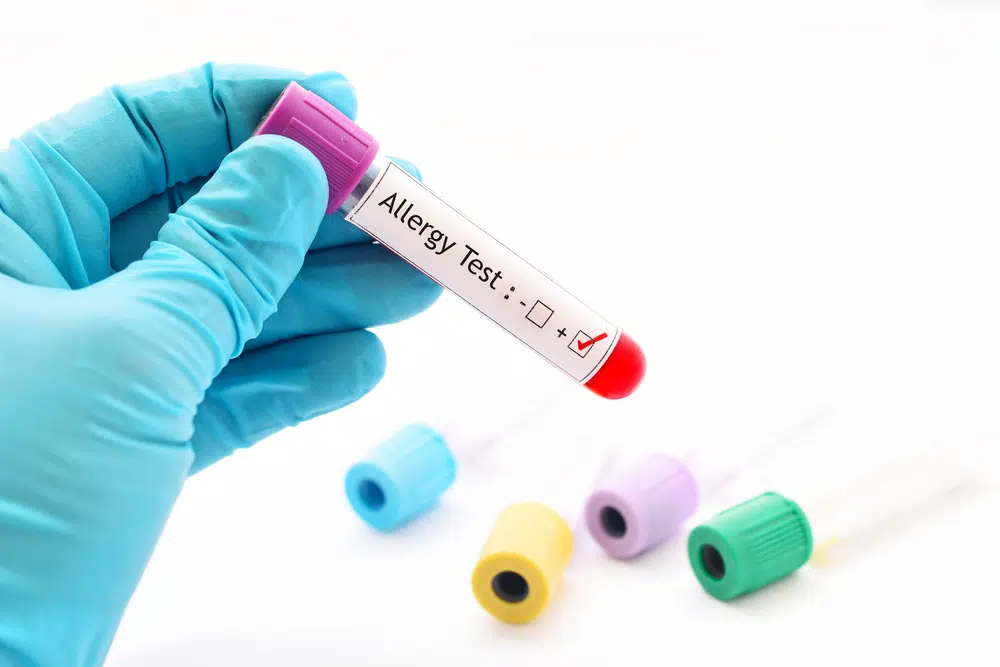
Seasonal Allergies Treatment
Seasonal allergies, also known as hay fever or allergic rhinitis, affect millions of people each year. These allergies are caused by the body’s immune system reacting to pollen or mold spores in the air. Symptoms can be severe, and they can significantly impact a person’s quality of life. The physicians at Penn Medicine Becker ENT & Allergy in New Jersey and Philadelphia have a variety of options to help alleviate seasonal allergy symptoms.
Benefits of getting Seasonal Allergy Treatment
Getting the proper treatment for seasonal allergies can help alleviate symptoms such as a runny nose, stuffy nose, and itchy nose. Seasonal allergens are most commonly found outdoors. However, indoor allergens can also be common triggers for allergy sufferers. Allergy specialists can determine the exact cause of allergies based on a patient’s medical history and then prescribe a tailored treatment plan.
In the United States alone, almost 50 million people suffer from seasonal allergies each year, with many of them opting for long-term use of over-the-counter medications to control their symptoms. However, these medications don’t necessarily address the underlying problem or prevent future allergic reactions. By getting treatments tailored to your individual needs and triggers from an allergy specialist, you can reduce the severity of your immune response and lessen the impact of seasonal allergies.

Understanding Seasonal Allergy Symptoms

Seasonal allergies are caused by exposure to pollen from trees and plants in the spring and late summer months, as well as animal dander and other outdoor allergens during the late spring and peak pollen season. Symptoms of seasonal allergies may include sneezing, itchy skin, nasal congestion, sore throats, shortness of breath, and more. Those with environmental allergies or pollen allergies may experience an increase in symptoms when exposed to ragweed pollen or other plant pollens during the peak pollen season or when indoors near allergens like dust mites or mold spores. By understanding your individual triggers and the signs of seasonal allergies, you can better manage their impact on your life.
Allergy Medications to Alleviate Symptoms
There are several types of allergy medications available to help manage seasonal allergy symptoms. These medications can be used alone or in combination, depending on the severity of symptoms and individual preferences.
Antihistamines
Antihistamines work by blocking the action of histamine, a chemical released by the immune system during an allergic reaction. They can help relieve sneezing, itching, and watery eyes. Cetirizine (Zyrtec), fexofenadine (Allegra), and loratadine (Claritin) are three popular over-the-counter antihistamines.
Decongestants
Decongestants help to reduce nasal congestion by narrowing blood vessels in the nasal passages. They can be taken orally or as a nasal spray. Over-the-counter decongestants include pseudoephedrine (Sudafed) and phenylephrine (Neo-Synephrine).
Nasal Steroids
Nasal steroid sprays function by diminishing inflammation within the nasal passages. They prove effective in alleviating issues like nasal congestion, sneezing, and itching. Well-known examples of nasal steroids are Fluticasone (Flonase) and Triamcinolone (Nasacort).
Leukotriene Modifiers
Leukotriene modifiers are prescription medications that work by blocking the action of leukotrienes, chemicals that contribute to inflammation and allergy symptoms. Montelukast (Singulair) is an example of a leukotriene modifier.
Allergy Shots
Allergy shots, or allergen immunotherapy, involve the administration of small amounts of allergens to help the body build a tolerance to them. Allergy immunotherapy is a long-term treatment approach that can help reduce the severity of allergy symptoms and potentially provide a long-lasting cure. Unlike medication which only provides temporary relief, allergy immunotherapy works to modify the immune system’s response to allergens.

Environmental Changes to Alleviate Allergic Symptoms
In addition to managing your symptoms with medications, it is important to make environmental changes to alleviate allergic reactions. This may include reducing exposure to allergens such as pollen by keeping windows and doors closed during peak pollen season, avoiding areas where high levels of allergens are present, wearing a mask when outdoors, and changing clothes after returning indoors. To minimize nasal stuffiness due to allergies, it is important to keep humidity levels low in the home and avoid any activities that could trigger an allergic response, such as dusting or vacuuming. Additionally, showering after spending time outdoors can help reduce allergen exposures. For those who experience an itchy throat due to allergies, some simple lifestyle changes, such as drinking lots of water and eating foods rich in vitamin C, can help manage symptoms.
Immunotherapy Treatments
Immunotherapy, also known as allergen immunotherapy or allergy shots, is a long-term treatment option for individuals with severe seasonal allergies. It involves the administration of gradually increasing doses of allergens, helping the body build tolerance and reducing the severity of allergic reactions over time. Immunotherapy can be effective in reducing symptoms and the need for medications and may even prevent the development of new allergies.

Alternative Therapies for Treating Symptoms
In addition to conventional treatments, some individuals may find relief from seasonal allergy symptoms through alternative therapies. While the effectiveness of these treatments may vary, they can be worth considering.
Neti Pot
A neti pot is a tool designed to flush the nasal passages with a saline solution. This practice can aid in clearing allergens, lessening congestion, and easing various allergy symptoms. Incorporating a neti pot into your routine during allergy season might offer relief from symptoms for certain individuals.
Herbal Remedies
Certain herbal remedies, such as butterbur extract and spirulina, have been shown to provide relief from seasonal allergy symptoms in some studies. However, it is essential to consult with a healthcare provider before trying any herbal remedies, as they may interact with other medications or cause adverse effects.
Acupuncture
Acupuncture is a traditional Chinese medicine practice that involves the insertion of thin needles into specific points on the body. Acupuncture is believed to help rebalance the body’s Qi (pronounced “chee”), which is the body’s energy flow, reducing allergy symptoms.
Some studies have shown that acupuncture may relieve seasonal allergy symptoms, although definitive evidence is limited.
Homeopathy
Homeopathy is an alternative medicine practice that involves the use of highly diluted substances to stimulate the body’s natural healing mechanisms. It is believed that these substances, derived from plants, animals, and minerals, can help alleviate symptoms of seasonal allergies.
Although some individuals may find relief from seasonal allergy symptoms through homeopathic remedies, the scientific evidence supporting their effectiveness is limited.
Supplements & Vitamins
Certain supplements and vitamins, such as vitamin C, quercetin, and bromelain, have been suggested to help alleviate seasonal allergy symptoms. However, the dosage, safety, and effectiveness of these supplements may vary, and it is important to consult with a healthcare provider before starting any new supplement regimen.
Aromatherapy
Aromatherapy involves the use of essential oils to promote physical and emotional well-being. Some individuals may find relief from seasonal allergy symptoms through the use of essential oils, such as eucalyptus, peppermint, or lavender. However, the effectiveness of aromatherapy for allergy relief is not well-established, and more research is needed.
Schedule your consultation
Why Choose Our Specialists?
- Dr. Elias Akl, is a distinguished allergist and immunologist based in Philadelphia. He holds board certifications in Allergy and Immunology as well as Internal Medicine, showcasing his expertise in multiple medical disciplines. Dr. Akl is not only board-certified in internal medicine but also a Fellow of the American Academy of Allergy Asthma and Immunology (FAAAAI).
- Dr. Kathryn Edwards, Director of Allergy & Immunology at The Penn Medicine Becker ENT & Allergy Center, is a board-certified allergist and immunologist who specializes in the diagnosis and treatment of allergies, food allergies, skin conditions, and asthma. She is a highly trained physician with extensive experience in the military, where she served as a pediatrician and chief of Allergy/Immunology. Dr. Edwards provides care for patients of all ages, from neonates to geriatrics.
- Dr. Naba Sharif is a highly skilled board-certified Allergist and Immunologist with expertise in diagnosing and treating allergies, including environmental and seasonal allergies, food allergies, and asthma. She received her medical degree from SUNY at Stony Brook School of Medicine, completed a Pediatrics residency at Hasbro Children’s Hospital of Brown University, and pursued a fellowship in Allergy and Immunology at the North Shore-Long Island Jewish Health System. She practiced as a Pediatrician and Allergist-Immunologist at Kaiser Permanente in Washington DC, was recognized as a Top Doctor by Washingtonian Magazine from 2016 to 2020, and is a Fellow of the American Academy of Allergy, Asthma & Immunology and the American College of Allergy, Asthma & Immunology. Dr. Sharif is committed to community service, health education, empowerment, and advocacy for the underprivileged.
- Dr. Jamie Zacharias is a highly accomplished and board-certified Allergist and Immunologist hailing from South Jersey. She pursued her education in her hometown, graduating from Bishop Eustace Preparatory School, and furthered her academic journey by earning her bachelor’s and medical degrees from Drexel University and the College of Medicine in Philadelphia, PA. Dr. Zacharias continued her medical training with an Internal Medicine internship and residency at Drexel University College of Medicine/Hahnemann University Hospital. Following this, she completed a comprehensive Allergy and Immunology fellowship at Penn State Hershey Medical Center, where she actively engaged in asthma research, particularly focusing on patient demographics and phenotyping. Dr. Zacharias holds memberships in esteemed organizations such as the Pennsylvania Allergy and Asthma Association, the American Academy of Allergy, Asthma, and Immunology, and the American College of Allergy, Asthma, and Immunology. Her specialization encompasses the diagnosis and treatment of various conditions, including asthma, immunodeficiencies, seasonal and environmental allergies, allergic reactions (including drug and food allergies), and skin conditions such as hives and eczema. Dr. Zacharias is dedicated to providing care across a wide age spectrum, from pediatric to geriatric patients, and she is excited to contribute to the well-being of her community where she has deep roots.

Pick one of our convenient locations
for your Seasonal Allergy Treatment
Frequently Asked Questions About Seasonal Allergies
In this section, we will address some common questions about seasonal allergies and their treatments. This information can help individuals better understand their condition and make informed decisions about their treatment options.
